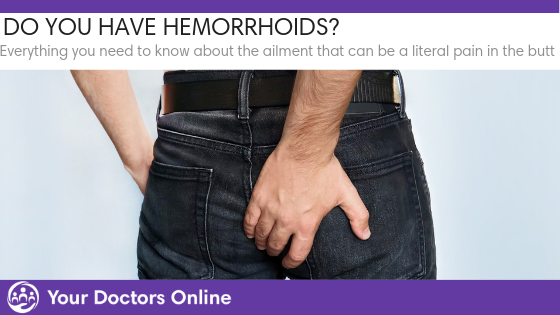Hemorrhoids are a pain in the butt-literally. Let’s take a closer look at the causes, treatment and prevention of this common ailment.
If you are experiencing rectal bleeding and discomfort, you most likely have hemorrhoids. However, hemorrhoids are rarely serious and usually clear up within a few weeks. To know more about the causes, treatment options, and preventive measures, you can read the guide below or consult one of our doctors today.
What are hemorrhoids?
Hemorrhoids, also known as piles, are swollen veins in the lower part of the rectum and anus. Hemorrhoids are more common than you think.
According to the National Institute of Diabetes and Digestive and Kidney Diseases (NIDDK) hemorrhoids affect 1 in 20 Americans.
Hemorrhoids are known to be accompanied by symptoms including itching, uneasiness, discomfort and bleeding. However, it is possible to not have any symptoms at all.
The primary cause of concern, when it comes to hemorrhoids, is rectal bleeding. It is common to notice a small amount of blood while passing stools. However, if you see heavier bleeding, it is recommended to consult your doctor to rule out any other serious conditions.

Usually, hemorrhoids heal with little to no treatment. Some cases need medical intervention. This is particularly true in the case you develop a clot. This is also known as a thrombosed hemorrhoid. The clot can cause pain and has to be drained by a medical professional.
Are there different types of hemorrhoids?
Yes, hemorrhoids can be classified as internal hemorrhoids and external hemorrhoids.
Internal hemorrhoids are small, swollen veins inside the rectum. They’re not visible but straining during bowl movements can cause them to bleed. In that case, you may notice bright red streaked stool or tiny amount of blood on your toilet paper.
There are cases where internal hemorrhoids bulge out as well. This happens when excessive strain pushes them out through the anal opening. These prolapsed hemorrhoids are painful, tender, and may cause mild to severe discomfort.
External hemorrhoids, on the other hand, are present under the skin around the anus and if irritated, can cause bleeding. Sometimes, a hard lump can also form if blood accumulates in the external hemorrhoid. This inflamed, painful lump is called a thrombosed hemorrhoid.
What are the common causes of hemorrhoids?
Hemorrhoids can be caused by a number of things. One factor is genes. Some people are more likely to develop hemorrhoids during some point of their lives if other family members have had a history of hemorrhoids.

Another main cause is diarrhea or constipation. Straining during bowl movements puts pressure on the veins in the anal canal causing them to swell. If diarrhea or constipation continues for a longer duration, it can cause the condition of hemorrhoids to worsen.
Weight gain is another culprit. This is the reason why a lot of pregnant women develop hemorrhoids in the last few weeks of their pregnancy. Weight gain, both due to obesity and pregnancy, can increase the pressure on the veins in the pelvic area causing them to swell and bleed.
What are the Symptoms of Hemorrhoids?
Hemorrhoids are accompanied by a number of symptoms and some of the most commonly reported ones include:
- Bleeding during bowel movements or seeing blood-streaked stool
- Itching or irritation around the anus
- Experiencing pain when passing stools
- Inflammation or swelling around the anus
- Formation of a lump near the anus
When should I see a doctor?

While it is true that hemorrhoids usually do clear up on their own, it is recommended to consult a doctor if they are causing pain, there is bleeding or they seem to be getting worse.
Bleeding during bowel movements is a symptom of hemorrhoids but it can also be an indication of another underlying condition.

In addition to bleeding, if you see a significant change in the color and consistency of your stools or are above forty years of age, speak to your doctor as the symptoms could also indicate colorectal or anal cancer.
Usually doctors conduct a physical examination along with a few tests to rule out any other conditions. A physical examination, sometimes coupled with anoscopy, can help identify the presence of hemorrhoids and your doctor can guide you accordingly.
What are my treatment options for Hemorrhoids?
When it comes to Hemorrhoids, there are a variety of treatment options, ranging from home remedies and creams to minimally invasive procedures and standard surgical procedures.
The type of treatment you need depends on your symptoms and condition of the hemorrhoids. Generally, if there is mild discomfort and the symptoms are not as intense, it is recommended to try out home remedies for a few days.
Some of the easiest things you can do is include more fibre in your diet. This could be through fruits, vegetables, whole grains and fibre supplements. Higher fibre and water intake helps soften and pass the stool.

Sitz baths can help too. Sitting in a bathtub filled with warm water for about 10 to 15 minutes, a few times a day does not only keep the area clean but can help reduce swelling and manage the pain. You can also apply ice packs to help with the swelling or inflammation.

If the pain is not manageable, over the counter pain relievers such as acetaminophen or ibuprofen can be taken. Additionally, over the counter ointments and creams containing hydrocortisone or witch hazel can help treat hemorrhoids at home. However, it is not recommended to use hydrocortisone creams longer than a week, as they can cause thinning of the skin.
Read more about over the counter treatment options here.

If these remedies are not effective in clearing hemorrhoids, doctors recommend medical procedures. Surgical procedures are only suggested if there is persistent bleeding, severe discomfort or recurring hemorrhoids. Some of these procedures include:
- Rubber band ligation is a minimally invasive procedure where a tiny rubber band is placed around the base of an internal hemorrhoid to cut off blood circulation, so that the hemorrhoid withers and falls off.
- Coagulation is a technique that uses laser or infrared light to cause the hemorrhoid to shrink and eventually fall off.
- Hemorrhoidectomy is a surgical procedure which is used to remove excessive tissue that is causing the problem. It does require anesthesia, so it is usually only done if you have large internal hemorrhoids or severe and recurring hemorrhoids.
Are there any preventive measures for Hemorrhoids?
A healthier lifestyle is the key to preventing hemorrhoids. Small, gradual changes in your diet and daily activities can be very helpful. For instance, staying active and incorporating moderate exercises in your daily routine will not only help keep your weight in check but also reduces the chances of getting constipated.
Additionally, try to add more fibre rich foods to your diet and drink plenty of water. This will help keep regulate bowl movements and prevent constipation.
Also, as simple as it sounds, go to the bathroom as soon as you have the urge. The longer you wait, the harder it gets to pass the stool. If you do get constipated, don’t force a bowel movement because that builds up pressure on the veins causing hemorrhoids to form.
If you are pregnant, avoid sleeping on your back. Try to sleep on your side. This can help lower the pressure on the blood vessels in your pelvis and prevent hemorrhoids from forming.
Some of the most frequently asked questions have been answered below for you. In case you have any other queries or would like to get medical advice from a doctor, feel free to reach out to one of our doctors.
FAQ
What do hemorrhoids look like?
What hemorrhoids look like depends on whether you have internal or external hemorrhoids and if they are prolapsed or thrombosed. It’s not possible to see internal hemorrhoids because they are located on the inside of the rectum. They are very similar to varicose veins.
Internal hemorrhoids become visible only when they prolapse and protrude outside the anus. In this case, you will most likely feel a bump, which may or may not be tender. This bump is caused by the swollen veins that have been pushed out of the anal opening.
External hemorrhoids are much easier to diagnose because they are almost always clearly visible. The skin is usually tender, there is swelling and itching. The inflamed lump is often quite painful.
Sometimes you may notice a blue-ish, purple hue. This is often a sign you have thrombosed hemorrhoids. The blue-ish skin tone appears because of a blood clot that has formed inside the swollen blood vessel. These hemorrhoids take longer to clear up and you may need medications to speed up the healing process.
What do hemorrhoids feel like?
External hemorrhoids are more painful than internal hemorrhoids. This is because the area surrounding the anus has more pain-sensing nerves and the overlying skin has more chances of getting irritated.
On the other hand, internal hemorrhoids are generally painless, even when there is bleeding because there are fewer pain receptors in that area of the body. Internal hemorrhoids only cause discomfort when they prolapse and protrude from the rectal area.
The pain is the worst when a blood clot forms inside external hemorrhoid. The pain may be accompanied by a burning sensation, itching, severe discomfort during bowel movements, and swelling.

How long do hemorrhoids last?
This depends on the size, type, and severity of hemorrhoids. While smaller hemorrhoids heal within a few days without medical treatment, others may take over two weeks as well as require medical treatment.
Hence, there is no set duration for how long hemorrhoids last. Though, it is recommended to consult a doctor if you’ve had symptoms for more than a week or your symptoms are consistently getting worse over time.











